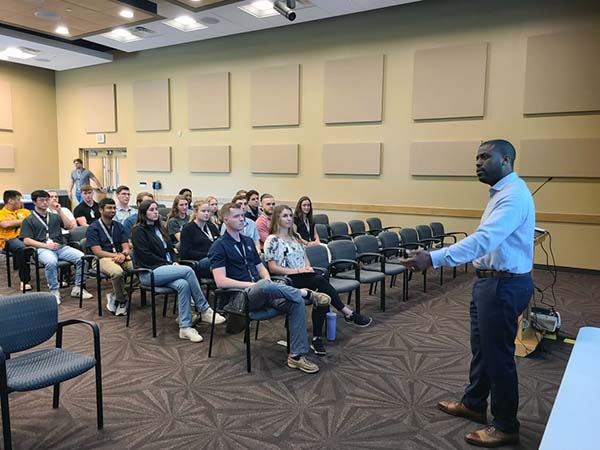Building student talent pipelines to cultivate critical skills development

Production Research, Development, and Integration (PRD&I) cultivates student talent pipelines that enhance skills essential for sustaining, stewarding, and modernizing Pantex and Y‑12’s production capabilities.
Essential skills include multiphysics modeling, production process modeling, advanced manufacturing, materials science and development, electrical engineering, nuclear criticality safety, and emergency response.
“Y‑12 relies on its Development organization for a ready cadre of subject matter experts that can be called upon to solve any plant problem. The Critical Skills Program brings in promising replacements to shore up our talent pipeline in not only our traditional areas of expertise, but also in new areas that are emerging such as automation and robotics, modeling, and advanced manufacturing,” said Randy Dziendziel, senior director of Development.
New talent pipelines for CNS include R&D fellowships, co‑op students, and researchers‑in‑residence — a program that allows employees to conduct research at universities for extended periods of time. These initiatives provide a range of opportunities for students to work with Pantex and Y‑12 technical staff on projects that develop expertise important for stewarding the sites’ production capabilities.
An example of multiple programs combining is how one Texas Tech student went from an undergraduate chemical engineering major to developing technical collaboration that creates new capability for the plants.
In 2022, Serée S. completed a Minority Serving Institution Partnerships Program‑funded internship with Pantex Development. In 2023, she came to Y‑12 to intern in Development. She has since been hired as a full‑time Y‑12 employee serving as a Researcher-in-Residence at Texas Tech University (TTU) for Y‑12. She is working on her Ph.D. in computational chemical engineering and expects to graduate in 2026.
Serée dedicates 60% of her time to research and development efforts, focused around solving problems and supporting projects at Y‑12. “I am passionate about bringing chemical engineering process modeling to CNS, Y‑12, Pantex, and the NNSA as a whole because I believe it will be one of the biggest contributors in integrating the advantages of modern technological advances in engineering with our mission,” she said.
Her remaining energy is focused on serving as a liaison between TTU and CNS, a role she is equally as passionate about. This position serves to further enhance the talent and technology/workforce capability transfer pipeline between schools and industry and highlight viable and enticing career paths for students.
Rapid advancements in technology require an increase in the energy and workforce dedicated to those enhancements, making the need for this student and capability pipeline urgent. Without those resources, our current and future production capabilities needed to deliver the mission are inhibited.
To address this need, the Critical Skills program helps universities understand what skills are needed. This allows schools to prepare students who are highly specialized for the work at Pantex and Y‑12. Through the program, CNS has developed relationships with 10 university departments across three universities and has funded 31 students on fellowships.
The Plant Directed Research and Development (PDRD) program builds off these relationships in an effort to recruit and retain people with the necessary skills to meet current and future production mission needs for Pantex and Y‑12.
Accordingly, Y‑12 PDRD Program Area Lead Mike Ellis and Pantex PDRD Program Manager Ed Graef developed a program that provided funding to directly hire 27 positions and build a talent pipeline. “The development of Pantex and Y‑12’s technical bench strength is vitally important to supporting our nation’s nuclear deterrent mission,” said Ellis. “I am proud to enable this effort and grow our technical expertise for current and future mission space.”
